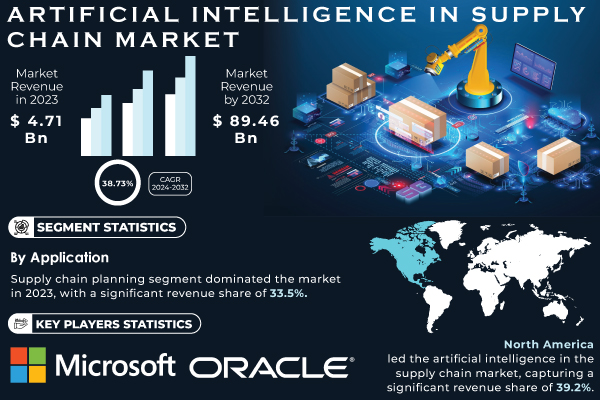Pune, Oct. 10, 2024 (GLOBE NEWSWIRE) -- Artificial Intelligence In Supply Chain Market Size Analysis:
“The SNS Insider report indicates that the Artificial Intelligence in Supply Chain Market was valued at USD 4.7 billion in 2023 and is expected to grow to USD 89.4 billion by 2032, achieving a CAGR of 38.73% over the forecast period from 2024 to 2032.”
The current development of the Artificial Intelligence in Supply Chain market is growing at a fast pace. As increasing customer demands, the need to improve operations and cut costs, the maturing of AI-related technologies. Organizations face significant pressure as customers seek increased convenience, forcing them to enhance their supply chain management. The need for the optimization of business operations and the reliance on big data contribute to the development of AI. As a global trend, organizations focus on digital transformation, with many leveraging AI to analyze big data sets and automate manual activities.
At the same time, there is a growing need for real-time data analysis helping to optimize supply chains. AI supports the tracking of the number of goods stocked in warehouses, anticipate their volatility in the market, and ensure timely supplies of products across the entirety of the supply chain. Consequently, organization can adjust their strategies based on AI data assessment to ensure the highest market responsiveness and customer satisfaction levels.

Get a Sample Report of Artificial Intelligence In Supply Chain Market@ https://www.snsinsider.com/sample-request/2503
Major Players Analysis Listed in this Report are:
- IBM - (IBM Watson Supply Chain, IBM Sterling Supply Chain Insights)
- Microsoft - (Azure AI for Supply Chain, Dynamics 365 Supply Chain Management)
- SAP - (SAP Integrated Business Planning, SAP Leonardo)
- Oracle - (Oracle Supply Chain Management Cloud, Oracle AI Applications)
- Amazon Web Services - (AWS) (AWS IoT, AWS SageMaker)
- Google Cloud - (Google Cloud AI, Google Cloud Supply Chain Solutions)
- Siemens - (Siemens Digital Logistics, Siemens Supply Chain Management)
- C3.ai - (C3 AI Supply Chain Suite, C3 AI Predictive Maintenance)
- JDA Software - (now Blue Yonder) (Blue Yonder Luminate Platform, Blue Yonder Demand Planning)
- Kinaxis - (RapidResponse, Kinaxis AI-Enabled Supply Chain Management)
- Manhattan Associates - (Manhattan Active Supply Chain, Manhattan Active Warehouse Management)
- SAP Ariba - (Ariba Network, SAP Ariba Procurement Solutions)
- Alibaba Cloud - (Alibaba Cloud Intelligent Supply Chain, Alibaba Cloud Data Analytics)
- ClearMetal - (ClearMetal Inventory Optimization, ClearMetal Demand Sensing)
- Zebra Technologies - (Zebra MotionWorks, Zebra Savanna)
- NVIDIA - (NVIDIA Clara for Supply Chain, NVIDIA Omniverse)
- Ineight - (Ineight Supply Chain Software, Ineight Project Management)
- Llamasoft - (Llamasoft Supply Chain Guru, Llamasoft Demand Planning)
- Everledger - (Everledger Supply Chain Transparency, Everledger AI-driven Solutions)
- Logility - (Logility Voyager Solutions, Logility Demand Planning)
AI is broadly used in supply chain management in such activities as demand forecasting, selection of optimal routes, the management of warehouses, and suppliers. The growing realization of the potential of AI to enhance activities vital to business will contribute to the growing market in the future. For instance, companies that have integrated AI into their supply chain processes have reported up to a 15% increase in operational efficiency. Moreover, continuous discoveries and improvements related to machine learning and data analysis will enhance the capacity of AI to deal with complex cases and provide meaningful insights for business activities.
Additionally, one of the growth-driving applications in the Artificial Intelligence in Supply Chain market is represented by modular robotics, which ensure a flexible, adjustable, and scalable warehouse operation automation. The ability to be reconfigured for various tasks, such as picking, packing, and sorting, enables such robots to better handle the dynamically developing demand. Modbot is one of the leading players in the market that provides modular robotic arms configured for precise task handling. Fetch Robotics is offers autonomous mobile robots as a part of its solution to work with material handling and managing inventory.
Artificial Intelligence In Supply Chain Market Report Scope:
| Report Attributes | Details |
| Market Size in 2023 | USD 4.71 billion |
| Market Size by 2032 | USD 89.46 billion |
| CAGR | CAGR of 38.73% From 2024 to 2032 |
| Base Year | 2023 |
| Forecast Period | 2024-2032 |
| Historical Data | 2020-2022 |
| Key Regional Coverage | North America (US, Canada, Mexico), Europe (Eastern Europe [Poland, Romania, Hungary, Turkey, Rest of Eastern Europe] Western Europe [Germany, France, UK, Italy, Spain, Netherlands, Switzerland, Austria, Rest of Western Europe]). Asia Pacific (China, India, Japan, South Korea, Vietnam, Singapore, Australia, Rest of Asia Pacific), Middle East & Africa (Middle East [UAE, Egypt, Saudi Arabia, Qatar, Rest of Middle East], Africa [Nigeria, South Africa, Rest of Africa], Latin America (Brazil, Argentina, Colombia Rest of Latin America) |
| Key Growth Drivers | •AI helps manage supply chain disruptions caused by geopolitical tensions, trade conflicts, and natural disasters through real-time data analysis •AI provides predictive insights, enabling faster, more accurate decision-making in logistics and inventory management. •AI helps companies forecast demand, manage order fluctuations, and ensure timely deliveries, enhancing customer satisfaction. |
Do you have any specific queries or need any customization research on Artificial Intelligence In Supply Chain Market, Make an Enquiry Now@ https://www.snsinsider.com/enquiry/2503
Segmentation Analysis
By End-Use
The automotive segment dominated the market and represented over 18.2% of total revenue share. The demand for Electric Vehicles and Autonomous Vehicles has been growing significantly. Yet, the production of such cars and trucks is more complicated since they required special components. Thus, AI can be utilized to monitor the various manufacturers contracted by the company, ensuring that all components are produced efficiently and on time. Moreover, advanced, AI-driven solutions are important for creating quality control systems that check whether vehicles meet all essential safety and performance requirements.
The retail segment is anticipated to have prominent growth at a CAGR during the forecast period. AI, analyzing sales data, internal trends, and external factors, is fundamental when it comes to demand forecasting since it ensures the increase of the accuracy rate. In such a way, retailers are enabled to sustain appropriate levels of inventory, thus, preventing stockouts that aggravate clients, and supersaturations that tend to decrease the value of goods due to the need to sell them promptly before. Additionally, with AI, companies can harmonize their tools for collecting information about stock at both online and land-based stores; the same relates to order placement and goods delivery. This, in turn, helps retailers avoid situations when consumers place orders for goods that are out of stock. Finally, AI helps in monitoring the progress of shipments and ensuring that retailers are aware of the location of their stock at every stage of production.
Artificial Intelligence In Supply Chain Market Segmentation:
By Offering
- Hardware
- Software
- Services
By Technology
- Machine Learning
- Computer Vision
- Natural Language Processing
- Context-Aware Computing
- Others
By Application
- Supply Chain Planning
- Warehouse Management
- Fleet Management
- Virtual Assistant
- Risk Management
- Inventory Management
- Planning & Logistics
By End-Use
- Manufacturing
- Food and Beverages
- Healthcare
- Automotive
- Aerospace
- Retail
- Consumer-Packaged Goods
- Others
Regional Landscape
In 2023, North America led the artificial intelligence in supply chain market, accounting for a revenue share of 38.4%. Companies in the region face stiff competition and demand to cut costs while maintaining high customer service. AI solutions for supply chains support automation of tasks, analysis of data, and determination of insights. It enhances efficiency and transparency while increasing the levels of agility in the supply chain.
However, the artificial intelligence in supply chain market in the Asia Pacific is likely to grow at the fastest CAGR during the forecast period. A substantial number of organizations in the region are using AI to improve the management of their supply chain. Several aspects of the region’s economy and technology have driven the growth. The Asia Pacific is home to the fastest growing market for e-commerce. E-retailers rely on AI to manage the supply chain for quick and efficient order processing, delivery and personalization of services.
India’s artificial intelligence in supply chain constituted a significant portion of the Asia Pacific in 2023. The nation has a booming economy with intricate supply chains that make it an ideal location for the implementation of AI in logistics and manufacturing. Issues that plague the Indian supply chain include congestion, erratic demand and poor logistics. AI solutions enhance route selection for delivery, managing traffic, predicting demand and selecting inventory.

Buy an Enterprise-User PDF of Artificial Intelligence In Supply Chain Market Analysis & Outlook 2024-2032@ https://www.snsinsider.com/checkout/2503
Recent Developments
In April 24, SAP SE announced major AI enhancements in its supply chain solutions, aimed at boosting productivity and efficiency in manufacturing by enabling real-time data analysis for better decision-making and streamlined processes.
In April 24, Vitesco Technologies GmbH partnered with DHL Group to strengthen supply chain resilience in the automotive sector by consolidating cargo volumes and optimizing transport solutions for eco-friendliness and cost efficiency.
Table of Contents – Major Key Points
1. Introduction
2. Executive Summary
3. Research Methodology
4. Market Dynamics Impact Analysis
5. Statistical Insights and Trends Reporting
6. Competitive Landscape
7. Artificial Intelligence In Supply Chain Market Segmentation, by Offering
8. Artificial Intelligence In Supply Chain Market Segmentation, by Technology
9. Artificial Intelligence In Supply Chain Market Segmentation, by Application
10. Artificial Intelligence In Supply Chain Market Segmentation, by End-Use
11. Regional Analysis
12. Company Profiles
13. Use Cases and Best Practices
14. Conclusion
Access Complete Report Details of Artificial Intelligence In Supply Chain Market Analysis Report 2024-2032@ https://www.snsinsider.com/reports/artificial-intelligence-in-supply-chain-market-2503
[For more information or need any customization research mail us at info@snsinsider.com]
SNS Insider Offering/ Consulting Services:
Go To Market Assessment Service
Total Addressable Market (TAM) Assessment
Competitive Benchmarking and Market Share Gain
About Us:
SNS Insider is one of the leading market research and consulting agencies that dominates the market research industry globally. Our company's aim is to give clients the knowledge they require in order to function in changing circumstances. In order to give you current, accurate market data, consumer insights, and opinions so that you can make decisions with confidence, we employ a variety of techniques, including surveys, video talks, and focus groups around the world.
